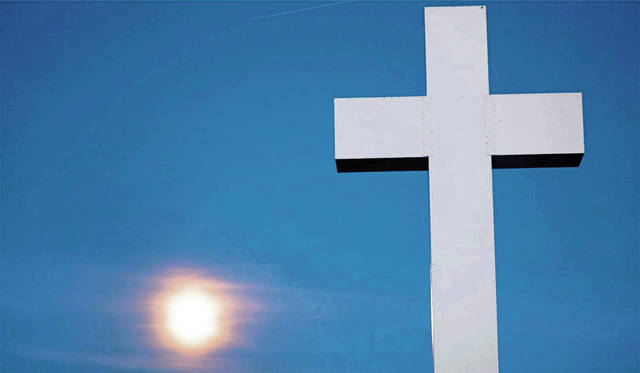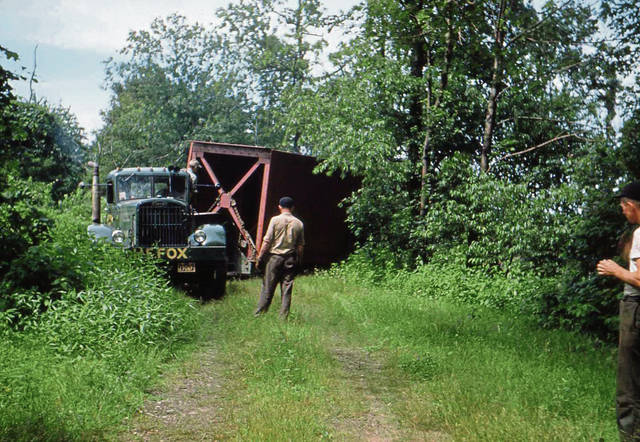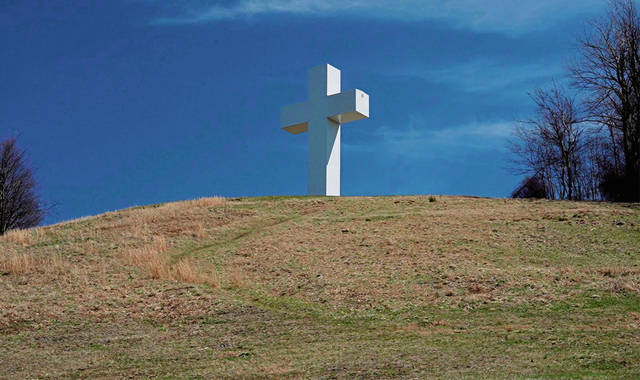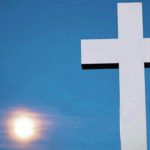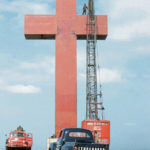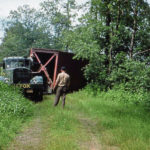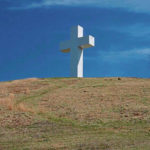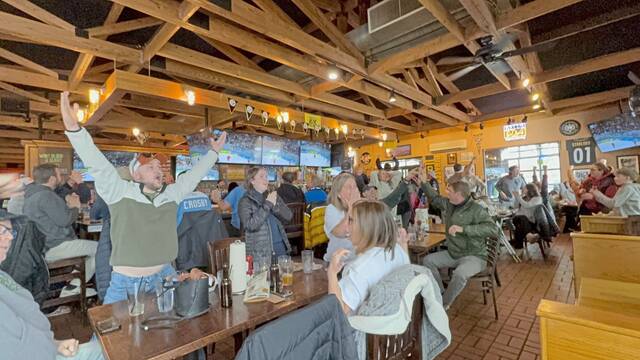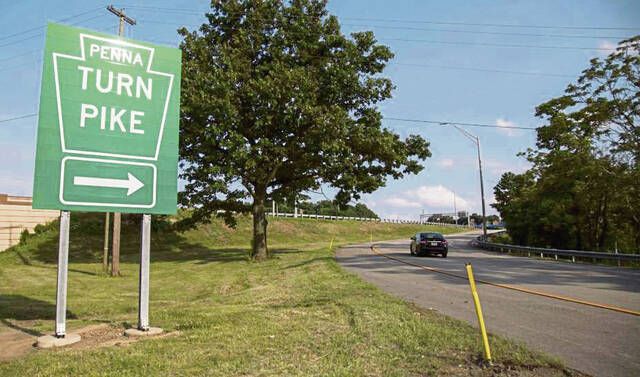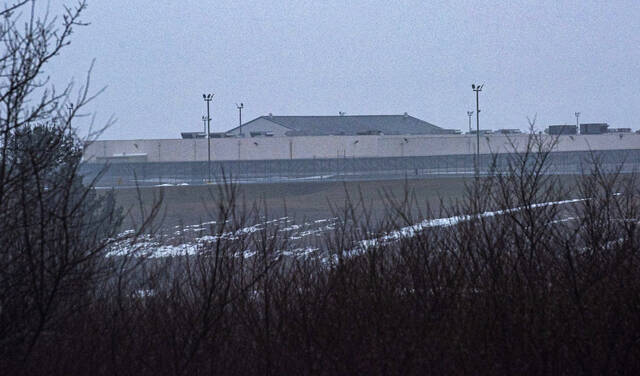Heather Withrow was drawn to the Cross of Christ in the 1990s.
Towering 60 feet atop Dunbar’s Knob, at the highest point above the affiliated Jumonville Camp and Conference Center, the shining white cross can be seen from miles away, including from Route 40.
Withrow discovered her favorite view of the steel cross as a youth, while she was attending a Methodist church retreat at the camp — part of a 280-acre site, temporarily closed because of the coronavirus pandemic.
“Coming out of the historic chapel at night, being able to look up and see the cross, it’s just beautiful and awe-inspiring,” she said.
Three decades later, she’s back at the nondenominational, Methodist-affiliated camp in Fayette County, as resident president of the organization that runs it. Once again, she’s able to admire the cross close at hand.
While many other things have changed over the years, Withrow said, “the cross stays constant.
“We sure do love it. It’s amazing the amount of people it brings to Jumonville.”
On Aug. 27, the cross will mark 70 years as a spiritual landmark on a section of Chestnut Ridge in North Union.
The site, with its commanding view of seven counties in three states, has an interesting and varied past. It served as a munitions cache for Colonial British forces during Gen. Edward Braddock’s ill-fated 1755 attempt to dislodge French foes from the future site of Pittsburgh.
The Jumonville name recalls Ensign Coulon de Jumonville, a French commander who was killed in 1754, when his troops were involved in a skirmish with forces led by a young George Washington and a Seneca chief.
Beginning in the 1870s, the future camp saw an incarnation as a school for orphans of the Civil War and, later, those of the Spanish-American War. It briefly served as a YMCA camp in the early 20th century.
The property, which included 179 acres in 1941, was donated by Harry Whyel, a Uniontown Methodist layman and a former trustee of the orphans’ school.
The idea of erecting a large cross on Dunbar’s Knob was delayed until after World War II because of a shortage of steel for nonwar efforts.
The cross project committee was chaired in 1948 by Louis C. Steiner, a member of Latrobe United Methodist Church and founder of Latrobe Foundry Machine & Supply Co. Steiner is credited with making a contribution to help offset the $24,000 cost of the cross.
Members of many Methodist congregations collected about $9,000 in coins to help support the cross — their names preserved for posterity in the 6-foot-tall concrete base of the sacred structure. According to Ted Steiner, Louis Steiner’s grandson and president of the company his grandfather founded, that money was set aside for maintenance.
The steel cross replaced a wooden predecessor. Ted Steiner notes that U.S. Steel rolled steel plates for the cross, Moore Metal Works in Greensburg fabricated its three sections, and Dils Construction Co. of Uniontown welded them together at the site.
An article on the Jumonville camp website indicates a road had to be cut to the construction site to transport the three parts of the cross — two projecting arms, each 12 feet long, and the main shaft, which weighed about 47,000 pounds. Interior bracing was designed to help the cross withstand winds of up to 100 mph.
“I don’t think you can help but be struck by the power of the cross,” said Franklin Blackstone Jr., 90, of Allison Park, who served as a counselor at the Jumonville camp in the early 1950s and now is director emeritus of the organization’s board. “It’s both a beautiful and a sacred site, with a marvelous view of the valley below.”
His wife, Bonnie, 80, was present as a child, along with extended family members, for the 1950 dedication of the cross. She returned later during family reunions. In 2016, she attended a worship service beneath the cross to mark the camp’s 75th anniversary.
Most vividly, she recalled a Communion service at the cross presided over by a Methodist bishop. “We were standing on the mountain with the breeze blowing and the sun shining,” she said. “It gave me a kind of heaven-on-earth feeling.”
Dan Kelley, 68, spent his childhood summers at the Jumonville camp, where his father, Kermit, was the manager from 1946-70. Kelley since has served on a council that oversees Family Week, held at the camp each July.
“As we were driving to camp in the summer, we tried to see who was going to be the first to spot the cross,” he recalled.
Some down-to-earth activities occurred on the hill that is home to the cross, noted Kelley, who lives in Blairsville.
“Being isolated on a mountaintop, we had to make our own fun,” he said. “Bread loaves used to come in these big boxes, and we would take them up and sled-ride down in the summertime.”
Kelley had the opportunity to meet some former students of the school for orphans and learned of a similar stunt that ended in trouble. “The orphans took a wagon wheel and rolled it down the hill, and it smashed into a barn door,” he said.
A news report posted by the Fayette County Historical Society recounts a tragic event on Dunbar’s Knob. Six passengers died in October 1957, during a rainstorm, when a twin-engine plane crashed into the wooded slope about 200 yards downhill from the cross.
The cross, vulnerable to rust, has been renovated and is periodically repainted in reflective white. Over the years, lights were added to illuminate the cross at night and a ground-level barrier was added to prevent vandalism, Withrow said.
Still, the cross stands.
“We maintain it in excellent condition,” Franklin Blackstone said of the cross. “It will be there for a long time.”
“The cross stands as a beacon of hope,” Withrow said. “I hope it’s a comfort to people, even to be able to see it from their cars.”


